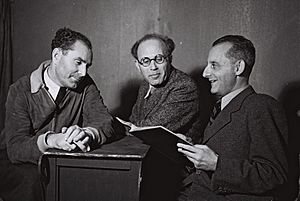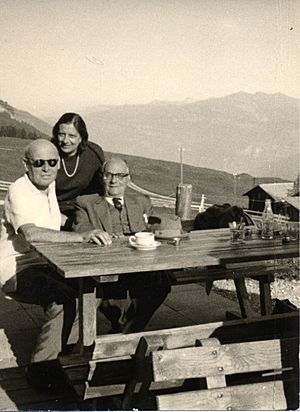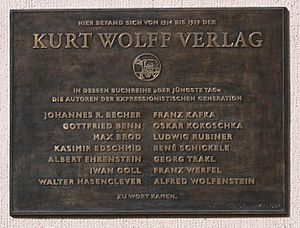Max Brod facts for kids
Quick facts for kids
Max Brod
|
|
|---|---|
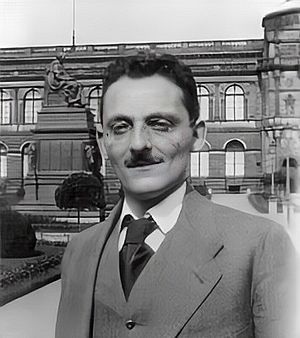
Brod in 1914
|
|
| Born | 27 May 1884 |
| Died | 20 December 1968 (aged 84) Tel Aviv, Israel
|
| Citizenship | Austria-Hungary, Czechoslovakia, Israel |
| Alma mater | German Charles-Ferdinand University in Prague |
| Occupation | Author, composer, journalist |
| Spouse(s) |
Elsa Taussig
(m. 1913; died 1942) |
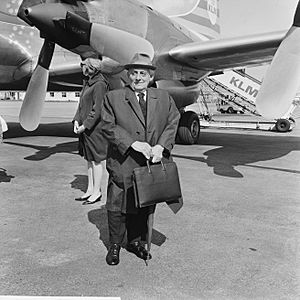
Max Brod (Hebrew: מקס ברוד; May 27, 1884 – December 20, 1968) was a famous writer, composer, and journalist. He was born in Prague, which was then part of Austria-Hungary. Later, he became an Israeli citizen.
Even though he wrote many books himself, Max Brod is best known as the close friend and biographer of the writer Franz Kafka. Kafka asked Brod to burn all his unpublished writings after his death. But Brod decided not to. Instead, he published Kafka's works, which made Kafka famous around the world.
In 1939, when the Nazis took over Prague, Brod moved to Mandatory Palestine (which is now Israel). He took a suitcase full of Kafka's important papers with him. These included many notes, diaries, and sketches that had never been published.
Contents
Max Brod's Life Story
Max Brod was born in Prague, the capital of what is now the Czech Republic. At the age of four, he had a serious spinal problem. He had to wear a special brace for a year. He was a hunchback his whole life.
Brod was a German-speaking Jew. He went to school with his lifelong friend Felix Weltsch. Later, he studied law at the German Charles-Ferdinand University. He finished his studies in 1907 and started working for the government.
From 1912, Brod became a strong Zionist. This means he supported the idea of a Jewish homeland. He said he was influenced by Martin Buber, a famous Jewish thinker. When Czechoslovakia became independent in 1918, Brod briefly served as vice-president of the Jewish National Council. From 1924, he worked as a critic for a newspaper called Prager Tagblatt.
Moving to Israel
In 1939, when the Nazis took control of Prague, Brod and his secretary, Elsa Taussig, fled to Mandatory Palestine. He settled in Tel Aviv, where he continued to write. He also worked for 30 years as a dramaturg (someone who helps choose and prepare plays) for Habimah, which later became Israel's national theater.
After his wife died in 1942, Brod published very few works for a while. He became close to a couple named Otto and Esther Hoffe. Esther worked as his secretary for many years. Brod passed on the important Kafka papers he had to Esther in his will. His close friend Felix Weltsch also supported him. Their friendship lasted 75 years, from elementary school in Prague until Weltsch's death in 1964.
Brod became more and more interested in music. He traveled to Europe to give talks and encourage young artists. Even though he was deeply affected by the horrors of National Socialism, he always worked for peace and understanding until he died. Max Brod passed away on December 20, 1968, in Tel Aviv. He is buried in the Trumpeldor Cemetery there.
Max Brod's Writing Career
Unlike his friend Kafka, Max Brod quickly became a very successful writer. He published 83 books and other works. His first novel, Schloss Nornepygge (Nornepygge Castle), was published in 1908 when he was only 24. It was praised in Berlin as a masterpiece of expressionism (a style of art and literature). This and other works made Brod a well-known name in German literature.
In 1913, he published a work called Anschauung und Begriff with his friend Weltsch. This made him even more famous in Berlin and Leipzig.
Brod also helped other writers and musicians become known. He supported Franz Werfel, though they later disagreed when Werfel left Judaism for Christianity. Brod also wrote about Karl Kraus, who converted from Judaism to Roman Catholicism. Brod's support was very important for the success of Jaroslav Hašek's book The Good Soldier Svejk. He also played a key role in making Leoš Janáček's operas popular.
Max Brod's Friendship with Franz Kafka
Max Brod first met Franz Kafka on October 23, 1902. Both young men were students at Charles University. Brod had given a lecture, and Kafka, who was a year older, spoke to him afterward and walked him home. Brod wrote that Kafka was usually quiet and hard to notice. But that day, Kafka seemed drawn to Brod and was more open than usual. He strongly disagreed with some of Brod's ideas during their long walk home.
From that day on, Brod and Kafka met often, sometimes even daily. They remained very close friends until Kafka's death. Kafka often visited Brod's parents' house. There, he met his future girlfriend and fiancée, Felice Bauer, who was Brod's brother-in-law's cousin.
After graduating, Brod worked at the post office for a while. The short working hours gave him time to start a career as an art critic and writer. Kafka took a job at an insurance agency for similar reasons. Brod, Kafka, and Brod's friend Felix Weltsch were known as the "close Prague circle."
During Kafka's life, Brod often tried to convince him that his writing was good. Kafka always doubted his own talents. Brod encouraged Kafka to publish his work. It is probably thanks to Brod that Kafka started keeping a diary. Brod tried to arrange writing projects they could work on together, but they never managed to write in tandem. This was because their ideas about writing and life were very different. However, they did publish one chapter from a travel book they tried to write in May 1912. Kafka wrote the introduction for it. Brod encouraged his friend to finish the project years later, but it didn't happen. Even after Brod married Elsa Taussig in 1913, he and Kafka remained each other's closest friends. They helped each other through problems and difficult times.
Publishing Kafka's Work
When Kafka died in 1924, Brod was in charge of his belongings and papers. Kafka had asked for all his unpublished works to be burned. But Brod refused to do this. He explained his decision by saying that when Kafka told him to burn the works, Brod replied that he would never do it. Brod believed that if Kafka had truly wanted his works destroyed, he would have chosen someone else to carry out his wishes.
Even before any of Kafka's most famous works were published, Brod had already called him "the greatest poet of our time." He even compared him to famous writers like Goethe or Tolstoy. As Kafka's works were published after his death (The Trial in 1925, The Castle in 1926, and Amerika in 1927), this early praise was confirmed by many critics.
When Brod fled Prague in 1939, he took a suitcase full of Kafka's papers with him. These included many unpublished notes, diaries, and sketches. Some of these materials were later edited and published in six volumes. However, much of it remained unreleased and became part of Brod's own collection of writings.
After Brod's death, this treasure of materials went to Esther Hoffe. She kept most of them until her own death in 2007. (One original manuscript of The Trial was sold at auction in 1988 for $2 million.) There was a legal dispute about what should happen to the papers because Brod's wishes were not entirely clear. The National Library of Israel argued that Brod wanted the papers to be donated to their institution. Esther's daughters, however, claimed that the papers were a direct inheritance for their mother. The daughters wanted to sell the materials to a museum in Germany. However, the Supreme Court of Israel ruled in favor of the National Library of Israel.
Max Brod's Music
Max Brod's musical compositions are not as well known as his writings. They include songs, pieces for piano, and music for his plays. He translated some of Bedřich Smetana's and Leoš Janáček's operas into German. He also wrote the first book about Janáček, which was first published in Czech in 1924. In 1961, he wrote a study about Gustav Mahler, called Beispiel einer deutsch-jüdischen Symbiose. Brod had studied how to arrange music for an orchestra with Alexander Uriah Boskovich.
Awards and Honors
- In 1948, Max Brod received the Bialik Prize for literature, a major award for Hebrew literature.
- In 1965, he was given the Honor Gift of the Heinrich Heine Society in Düsseldorf, Germany.
- Also in 1965, he received the Austrian Decoration for Science and Art. He was the first Israeli citizen to receive this honor.
Published Works
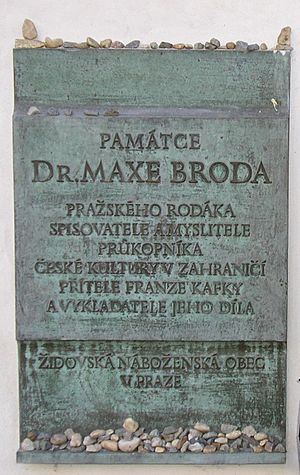
- Schloß Nornepygge (Nornepygge Castle, 1908)
- Weiberwirtschaft (Woman's Work, 1913)
- Über die Schönheit häßlicher Bilder (On the Beauty of Ugly Pictures, 1913)
- Die Höhe des Gefühls (The Height of Feeling, 1913)
- Anschauung und Begriff: Grundzüge eines Systems der Begriffsbildung, 1913 (with Felix Weltsch)
- Tycho Brahes Weg zu Gott (Tycho Brahe's Path to God, 1915)
- Heidentum, Christentum, Judentum: Ein Bekenntnisbuch (Paganism, Christianity, Judaism: A Credo, 1921)
- Sternenhimmel: Musik- und Theatererlebnisse (1923, reissued as Prager Sternenhimmel)
- Reubeni, Fürst der Juden (Reubeni, Prince of the Jews, 1925)
- Zauberreich der Liebe (The Charmed Realm of Love, 1930)
- Biografie von Heinrich Heine (Biography of Heinrich Heine, 1934)
- Die Frau, die nicht enttäuscht (The Woman Who Does Not Disappoint, 1934)
- Novellen aus Böhmen (Novellas from Bohemia, 1936)
- Rassentheorie und Judentum (Race Theory and Judaism, 1936)
- Annerl (Annie, 1937)
- Franz Kafka, eine Biographie (Franz Kafka, a Biography, 1937, later collected in Über Franz Kafka, 1974)
- Franz Kafkas Glauben und Lehre (Franz Kafka's Thought and Teaching, 1948)
- Die Musik Israels (The Music of Israel, Tel Aviv, 1951)
- Beinahe ein Vorzugsschüler, oder pièce touchée: Roman eines unauffälligen Menschen (Almost a Gifted Pupil, 1952)
- Die Frau, nach der man sich sehnt (The Woman For Whom One Longs, 1953)
- Rebellische Herzen (Rebellious Hearts, 1957)
- Verzweiflung und Erlösung im Werke Franz Kafkas (Despair and Redemption in the Works of Franz Kafka, 1959)
- Beispiel einer deutsch-jüdischen Symbiose (An Example of German-Jewish Symbiosis, 1961)
- Johannes Reuchlin und sein Kampf (A Historical Monograph, 1965)
- Der Prager Kreis (The Prague Circle, 1966)
- Die verkaufte Braut, translation of the Czech libretto of Prodaná nevěsta (The Bartered Bride, a comic opera by Bedřich Smetana), and many other translations of Czech opera libretti
- Über Franz Kafka, (Fischer, Frankfurt am Main, 1974)
Selected Filmography
- The Woman One Longs For (1929)
See also
 In Spanish: Max Brod para niños
In Spanish: Max Brod para niños
- Exilliteratur
- List of Bialik Prize recipients
 | Emma Amos |
 | Edward Mitchell Bannister |
 | Larry D. Alexander |
 | Ernie Barnes |


